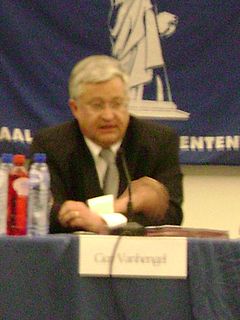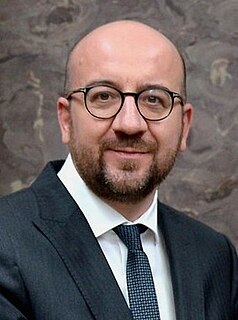
Guy Maurice Marie Louise Verhofstadt is a Belgian politician who was the Leader of the Alliance of Liberals and Democrats for Europe from 2009 to 2019, and has been a Member of the European Parliament (MEP) from Belgium since 2009. He was the 47th Prime Minister of Belgium from 1999 to 2008 and Deputy Prime Minister and Minister of Budget from 1985 to 1992. He was a Member of the Chamber of Representatives from 1985 to 2009.

Open Flemish Liberals and Democrats, commonly known as Open VLD or simply as the VLD, is a conservative-liberal Flemish political party in Belgium. The party was created in 1992 from the former Party for Freedom and Progress (PVV) and politicians from other parties. The party led the government for three cabinets under Guy Verhofstadt from 1999 until March 2008. Open VLD most recently formed the Federal Government with N-VA, CD&V and the Francophone Reformist Movement (MR).

Groen, founded as Agalev, is a green Flemish political party in Belgium. Its French-speaking equivalent is Ecolo; the two parties maintain close relations with each other.
The Reformist Movement is a liberal French-speaking political party in Belgium. The party is in coalition as part of the Michel Government then Wilmès Government since October 2014, having provided two prime ministers since. After the 2007 general election the MR was the largest Francophone political formation in Belgium, a position that was regained by the Socialist Party in the 2010 general election.
Regional elections were held in Belgium, to choose representatives in the regional councils of Flanders, Wallonia, Brussels and the German-speaking Community on 13 June 1999. The regional elections were held on the same day as the European elections and the federal elections.
The Party for Freedom and Progress was a liberal political party in Belgium which existed from 1961 until 1992. The party was the successor of the Liberal Party, which had roots dating back to 1846. It was succeeded in the Flemish Community of Belgium by the Flemish Liberals and Democrats (VLD) and in the French Community by the Liberal Reformist Party, Parti des Réformes et des Libertés de Wallonie and the current-day Reformist Movement. In the German-speaking Community, it still exists as the Party for Freedom and Progress.
This article gives an overview of liberalism in Belgium. It is limited to liberal parties with substantial support, mainly proved by having had a representation in parliament. The sign ⇒ denotes another party in that scheme. For inclusion in this scheme it is not necessary that parties labeled themselves as a liberal party.

Flemish political parties operate in the whole Flemish Community, which covers the unilingual Flemish Region and the bilingual Brussels-Capital Region. In the latter, they compete with French-speaking parties that all also operate in Wallonia. There are very few parties that operate on a national level in Belgium. Flanders generally tends to vote for right-wing, conservative parties, whereas in French-speaking Belgium the socialist party is usually the most successful one.

The Federal Government of Belgium exercises executive power in the Kingdom of Belgium. It consists of ministers and secretary of state drawn from the political parties which form the governing coalition. The federal government is led by the Prime Minister of Belgium, and Ministers lead ministries of the government. Ministers together form the Council of Ministers, which is the supreme executive organ of the Government.

Anne-Marie Cécile J. Neyts-Uyttebroeck is a Belgian politician and was a Member of the European Parliament for Flanders with the Open Flemish Liberals and Democrats, member of the Alliance of Liberals and Democrats for Europe, where she sat on the European Parliament's Committee on Foreign Affairs.

The Flemish Government is the executive branch of the Flemish Community and the Flemish Region of Belgium. It consists of a government cabinet, headed by the Minister-President and accountable to the Flemish Parliament, and the public administration divided into 13 policy areas, each with an executive department and multiple agencies.

The Dutch-speaking electoral college is one of three constituencies of the European Parliament in Belgium. It currently elects 12 MEPs using the D'Hondt method of party-list proportional representation. Previously it elected 13 MEPS, until the 2013 accession of Croatia. Before that, it elected 14 MEPs, until the 2007 accession of Bulgaria and Romania.

The 2007 Belgian federal election took place on Sunday 10 June 2007. Voters went to the polls in order to elect new members for the Chamber of Representatives and Senate.

The June 13, 1999 Belgian federal elections was a Belgian election for the Belgian Chamber of Representatives and Belgian Senate. The federal general elections were held on the same day as the European elections and the regional elections. The Flemish Liberals and Democrats (VLD) became the largest party.

Guy Vanhengel is a Flemish politician for the Flemish Liberals and Democrats (VLD).
The Agriculture Minister of Belgium is the political minister office responsible for agriculture. In 2001, the Regions became mainly responsible for agriculture as part of the fifth state reform.

The Verhofstadt II Government was the federal government of Belgium from 12 July 2003 to 21 December 2007.

The Di Rupo Government was the federal cabinet of Belgium sworn in on 6 December 2011, after a record-breaking 541 days of negotiations following the June 2010 elections. The government included social democrats (sp.a/PS), Christian democrats (CD&V/cdH) and liberals, respectively of the Dutch and French language groups. The government notably excluded the New Flemish Alliance (N-VA), the Flemish nationalist party which achieved a plurality and became the largest party. Its absence, together with the unwillingness of Open Vld to enter into an eight-party coalition that included the green parties, caused the government coalition to lack a majority in the Dutch language group. It was the first time that the Belgian prime minister had been openly gay, as Di Rupo became the world's first male openly gay head of government. Elio Di Rupo became the first native French-speaking prime minister since 1979 and the first prime minister from Wallonia since 1974 and first socialist prime minister since 1974.

The Bourgeois Government (Regering-Bourgeois) was the Flemish Government formed following the 2014 Flemish Parliament election. The cabinet consisted of a centre-right coalition of the nationalist New Flemish Alliance (N-VA), the Christian Democratic and Flemish party (CD&V) and the Open Flemish Liberals and Democrats. It had a large majority in the Flemish Parliament and the main opposition parties were the Socialist Party (sp.a), which had been part of nearly all previous governments in recent history, and the Green party.

The Michel I Government was the Federal Government of Belgium formed following the 2014 Belgian government formation and sworn in on 11 October 2014. The administration is a centre-right coalition of the New Flemish Alliance (N-VA), the Christian Democratic and Flemish (CD&V), the Open Flemish Liberals and Democrats and the Reformist Movement (MR). The prime minister is Charles Michel. The government had an agenda of socio-economic reforms, especially through austerity measures, with its priorities being improving Belgium's economic competitiveness and reducing unemployment. It fell in December 2018 over the Global Compact for Migration.















